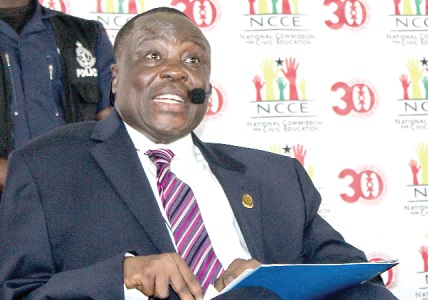
We need political will to amend constitution - Justice Pwamang
A justice of the Supreme Court, Justice Gabriel Pwamang, has said the country needs political will to reform the 1992 Constitution in line with Chapter 25 (the chapter on amendment) of the constitution.
He, however, said for that to be realised, it would need the cooperation of both sides of Parliament and other stakeholders.
Speaking at this year’s Constitution Week Lecture and panel discussion in Accra yesterday, Justice Pwamang said while the call for constitutional amendment needed to be prioritised, “there is no doubt that the final process of amendment would definitely require the cooperation of both sides of Parliament.
“Considerable attention needs to be paid to the torrent of calls for constitutional amendment sweeping across the country from religious leaders, civil society to politicians.
“Not only must the calls for amendment be given significant primacy, but necessary steps must be taken towards implementing constitutional reforms,” he said.
According to Justice Pwamang, as at the time the 1996 amendments were made, the constitution had not lived that long, but because of political will, some important changes were made, adding that: “I believe those changes enabled the constitution to deal with challenges that would have been with us today if they had not been tackled then”.
Event
The lecture was on the theme: “Three decades of uninterrupted constitutional rule: Revisiting the agenda for reforms”.
Other speakers were the Executive Director of the Centre for Democratic Development Ghana, Prof. Henry Kwasi Prempeh; a lecturer at the University of Ghana School of Law, Clara Beeri Kasser-Tee, and a senior lecturer from the University of Ghana Political Science Department, Dr Seidu Alidu.
Participants included members of academia, civil society organisations, state institutions, members of parliament, ministers of state and the general public.
![]()
The National Commission for Civic Education (NCCE) initiated the week celebration in 2001 to commemorate the country’s return to constitutional democratic rule.
It is characterised by public engagements on the country’s guiding document — the 1992 Constitution.
Strides
Justice Pwamang, who was part of the 2010 Constitutional Review Committee, said in spite of the significant strides made towards amending the constitution which included the work of a committee set up in 2010, the country was yet to move that process to its logical conclusion through the Cabinet and the Council of State.
He mentioned the local government structure, deconcentration of power over public resources which was currently vested at the centre, and enhancement authority of lower-tier political structures to exact greater responsibility as some of the areas that could be considered in the proposed amendment.
Justice Pwamang further said that the country has had enough time to assess the constitution better, adding that “studies have been conducted by academicians and consultations undertaken so we have no viable excuse to continue to hold back on effecting the needed changes”.
“I will suggest that we respond to the renewed calls for reforms by moving forward the 2010 process with identification of areas of apparent consensus in election manifestoes of the major political parties and galvanise resources and energies of civil society around these”.
“I sincerely hope that such renewed effort would afford space for arising young energetic civil society groups to influence the course of changing their future by channelling their creativity as younger generation into results-oriented consultations,” he said.
Advice
The acting Chairperson of NCCE, Kathleen Addy, advised the people to fearlessly and unequivocally reject purveyors of chaos who advocate the disorderly overthrow of the 1992 Constitution.
She said while the framers of the 1992 Constitution anticipated a time for review, it was important for all stakeholders to come together to commit to the process by developing a road map for reforms.
According to her, the commission was ready to work on any established process to lead the way toward reforming the constitution.
On the celebration of the week, Ms Addy said her outfit would hold similar dialogues in other regional capitals to feed into a national discussion of the theme.
She said the commission would engage 10,000 basic schools on a sub-theme: “Sustaining our democracy: Ghanaian values in practice,” to ignite the spirit of patriotism and respect for core values of discipline, trustworthiness, integrity and loyalty in the youth.
